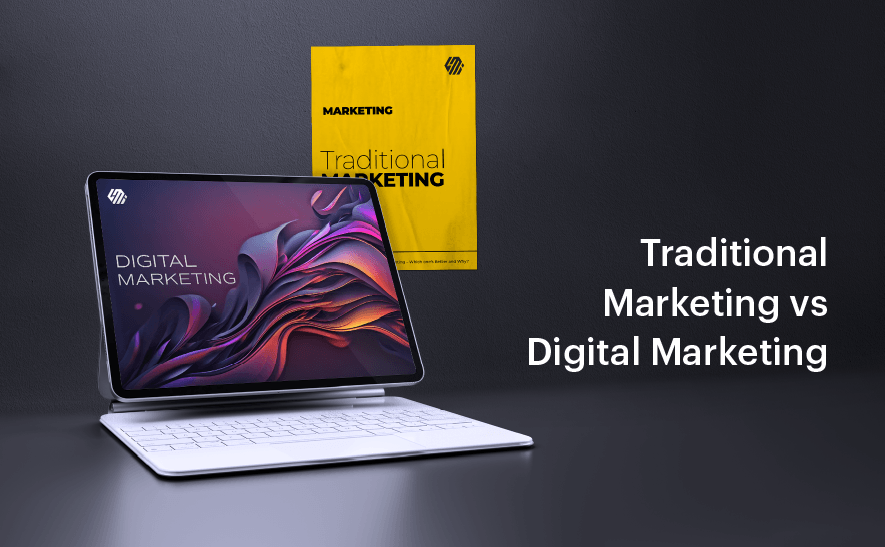Traditional Marketing vs Digital Marketing – Which one’s Better and Why?

No matter how big or small your business is, or what goods or services you sell, it is important to market your products.
Marketing is nothing but using different methods to promote your goods and services known to the public in such a way as to induce them to buy, and it includes advertisements and research. Today the competition is severe, and it continues to intensify every single day – which is why marketing is extremely critical now.
There are two major approaches to marketing and numerous platforms for both. So how will you choose the right one for you? Let’s examine both in some detail.
What is Traditional Marketing?
Traditional or Conventional marketing includes those methods that have been around for ages and don’t require the internet. They are being used relatively less nowadays. They do have their strong points.
Traditional marketing examples:
- TV and radio ads
- Ads in magazines and newspapers
- Billboards and hoardings on streets
- Flyers in the mail or newspapers
- Phone calls and SMS
- Referrals or word-of-mouth marketing
- Product launch events
- Expos, trade shows, etc
- Postcards, informational packets, and coupons are mailed directly.
We come across many of these ads in our daily lives, just by switching on the TV or picking up a newspaper or magazine to read – or even as we step out onto the road.
What is Digital Marketing or Online Marketing?
This approach uses the internet and this is the main point of how digital marketing is different from traditional marketing. Digital marketing is also very effective, even though it is relatively new. Digital marketing helps businesses to create and build their online presence through these methods:
- Website
- Blogs
- Email campaigns
- SEO
- PPC or clickable ads
- Social media posts
- Videos on website
- YouTube videos
- Affiliate marketing
- Online contests
- Local business optimization
With internet penetration touching new highs everyday and mobile users increasing by leaps and bounds, digital marketing strategies are popular as well as effective.
Before we delve into traditional marketing vs digital marketing, let us take a look at the pros and cons of both approaches first.
Advantages of Traditional Marketing

One may think that traditional marketing methods have become outmoded and irrelevant, but many of these methods are not only used today, but also effective. These are the benefits of traditional marketing:
- Traditional marketing methods help you reach out to the older demographic (50 and over) very effectively
- It creates a strong impact on the viewer
- It is the best strategy for businesses that want to focus on the local customers. Billboards, flyers, and events will serve them much better than competing in the digital space
- Ads on TV and radio are played multiple times, reminding the audience about the business and the product, and making an impact in their minds.
- Hard copies of these ads can be saved and reused in the future with or without changes
- They are easily recognizable by people as they are used to this kind of marketing
- You can connect to the audience easily by playing ads on local TV channels or FM radio stations
Disadvantages of Traditional Marketing
- Traditional marketing methods can be very expensive. Even if you want to print postcards for the local audience, you will have to shell out quite a big amount, and this is one of the biggest disadvantages of traditional marketing
- Results from traditional marketing methods are slow in manifesting
- There is no way you can be certain if people have gone through your ads in the print media
- There is no direct interaction between the business and the customer
- The results are tough if not impossible to measure
You should have got a fairly clear idea about how traditional marketing works, so now let us move on to the pros and cons of digital marketing.
ALSO READ: A Guide to Website Architecture Design
Advantages of Digital Marketing

While digital marketing is a fairly recent phenomenon, it is constantly innovating and evolving, and we see new methods of digital marketing emerge very frequently. Voice search and image search are recent innovations that are transforming how customers search for products online. Social media is extensively used to market products. It is important to take note of social media pros and cons, and consider the following possible ways to carry out digital marketing:
- You can track data and audience engagement in real-time as you get immediate notifications whenever people click on links to your site, read your emails, follow you on social media, likes or shares your posts, and so on. This data provides several insights which help you see which methods are effective and which are not, and you can take corrective action to fix ineffective strategies. You can also get to see what part of the day is best to post to get the most engagement. The ability to measure the results of digital campaigns is one of the digital marketing advantages you can get.
- They are much less expensive as compared to the conventional method. For example, sending emails costs you nothing but printing postcards or flyers is a big expense.
- You can tap into new markets and expand your reach even across international borders
- You can easily target a specific type of buyer and create ads just for them
- You can offer personalised messaging to attract customers
- It is much more engaging, and you can respond to customer comments on social media, offer support through live chat, and so on.
- It is not intrusive, unlike TV commercials which come on in the middle of your favorite shows, or exciting sports matches
- Digital marketing has cross-industry suitability; every business can carry out some kind of digital marketing campaign, especially as the cost is lower
- Once you post an ad or banner online, it is there forever; the internet does not forget! Whereas you put up a hoarding or billboard for a limited period.
Disadvantages of Digital Marketing
- Users can use ad-blockers to prevent your banners or popup ads from playing; while this is beneficial to the viewer, it is also one of the biggest limitations of online marketing.
- Paying for premium services from sites like YouTube and Spotify removes ads
- As new trends keep appearing very frequently, digital marketing strategies have to be looked at and assessed to check how effective they are in that particular scenario – what is effective one day may not be so the next day
- Regulation by search engines like Google also necessitates a change in strategy as they may rule a particular method as unacceptable
- You need to have someone with expertise in the field who knows your business well to be able to get the maximum ROI.
ALSO READ: The Impact of eCommerce on Society and Business
Traditional Marketing vs Digital Marketing
- Traditional marketing uses print media, live events, TV and radio, and other methods that have been around for a long time, while digital marketing campaigns are run online, through social media, websites, blogs, and more.
- Conventional marketing is one-way communication and static; digital marketing is dynamic and involves two-way communication, with customers commenting on the content you provide, which you can then again respond to.
- Customer engagement is very high in digital marketing whereas there is little to no engagement in traditional marketing methods – only a few, like live in-person events and contests, induce customer participation.
- Digital marketing is data-driven, unlike traditional marketing.
- It is easier and faster to convert prospects to lead through digital marketing methods in comparison to traditional marketing. People see ads according to their preferences, instantly qualifying them as leads.
- ROI can be calculated only in digital marketing, but this is not possible in conventional marketing methods
- Traditional marketing methods can be very expensive; digital marketing helps you save money.
- Digital marketing enables you to track and follow the customer to see their browsing history online, what they are showing interest in, how many visitors are purchasing, how long they spend on your website, and more. This cannot be done at all in traditional marketing.
- Traditional marketing is standardized and generic and done on a mass scale, and there is no personal touch involved. On the other hand, digital marketing allows you to target customers with specific, personalised marketing messages that are sure to pique their interest.
- Once you place an ad in a newspaper, or print flyers or postcards, you cannot make any changes to it – you will have to redo it all, incurring even more expense. However, digital ads can be tweaked to make whatever changes you need to make.
- The reach of traditional marketing methods is limited to a specific geographical location, but with a website or social media ads, you can display your ad to the whole world if you want. Of course, you can localise it as well if required.
- Digital marketing brings results far more quickly than traditional marketing campaigns.
- Traditional marketing is invasive and outbound marketing, whereas digital marketing is inbound and non-invasive
Which Method of Marketing Should you Choose?
You have read all about the various marketing platforms and methods as well as the pros and cons of both digital, and conventional marketing strategies. So then, which method will you choose for your business?
It is not an easy answer, and you should definitely refrain from making an off-the-cuff decision. You need to have comprehensive and detailed knowledge about not just your business, but also your target customers. You must do some research to see what impact each method has on your business.
Your target customers, or buyer persona, is the main factor that will help you decide.
- What do my target customers like?
- What do they have access to?
- What are their pain points, their goals?
When you can answer these questions, you will get the answer to the question of which marketing method to use.
Let’s suppose your target audience has poor internet connectivity or access, or does not prefer digital media, the answer is crystal clear – you go with traditional methods. If however, they are the type who are permanently glued to their devices, then you definitely need digital.
In most cases though, it may not be so black and white as this. You may need to use bits of both methods to effectively market your goods and services, as each method does have its advantages and strong suits.
How you want to split it, and how much you want to spend overall, and on each method, depends again on your budget, and your target audience. You may even have to try out a few permutations and combinations till you get it right.
In today’s fast-paced digital landscape, having a well-structured marketing strategy is essential for business success. That’s where Webandcrafts (WAC) comes in. With expertise in digital marketing services, WAC helps businesses craft data-driven strategies that seamlessly integrate marketing and sales efforts for optimal results. From SEO, Performance Marketing, content marketing, and social media management to conversion-focused campaigns, WAC ensures that your brand reaches the right audience and maximizes engagement. With a strong commitment to delivering measurable success, WAC is the partner you need to elevate your digital presence and drive business growth. Get in touch with us today!

Proven Digital Marketing Services
Engage with your customers and achieve your business goals with data-driven marketing solutions
- How to Increase Views on Instagram Reels in 2025 – Proven Viral Hacks
- Email Writing Format: How to Write an Email Effectively (Tips and Examples)
- How to Make a Viral Video: Viral Tips For Online Success
- The Scope of Digital Marketing in 2025 & Beyond
- 20 Best Advertisement Examples of All Time for Creative Inspiration
Discover Digital Transformation
Please feel free to share your thoughts and we can discuss it over a cup of tea.










